Bushfire victims are calling on the government to act urgently on climate change and have shared their harrowing stories.
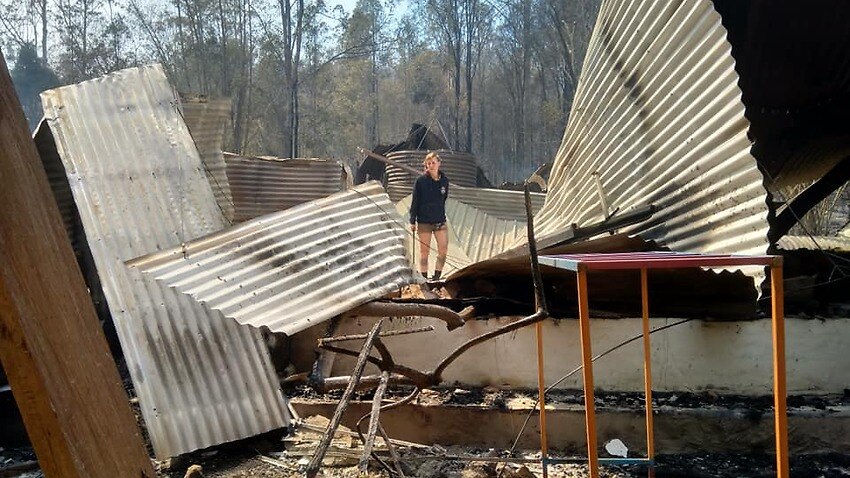
Fiona Lee lost her home during the 2019-2020 Black Summer bushfire season. Source: Supplied
LONG READ
Jann Gilbert lost everything when her house was destroyed in the Black Summer bushfires, and fears she and other bush dwellers will again experience infernos of equal intensity if Australia does not take urgent action to reduce carbon emissions.
She has one frank message for Prime Minister Scott Morrison — who has made a pledge of net zero by 2050 backed by a controversial plan, and has resisted calls to make deeper cuts to emissions by 2030 — if his government does not act swiftly.
"If he's not prepared to do something... I want him to get out of the way and let someone else do the job," Ms Gilbert said.

Jann Gilbert's house was destroyed in the Black Summer bushfire season, which ravaged parts of the eastern coast in 2019-2020. Source: Supplied
After a struggle between the Liberal Party and its coalition partner The Nationals over the net zero target, Mr Morrison formally confirmed at the COP26 climate change summit in Glasgow this month that Australia would commit to this goal.
But he has attracted criticism for not committing to lifting the nation's short-term target.
Australian bushfire victims also want more to be done.
Bushfire survivors remember Black
'I'm furious at the way the climate crisis has been dealt with'
Bushfires aren't unusual in Australia, but climate change is thought to be making them worse.
The Black Summer bushfire season which ravaged parts of the eastern coast in 2019-2020 is often cited as an example of how a natural part of the Australian environment is worsening as the earth warms, and have been labelled as a "wake up call" to rapidly reduce emissions by some researchers.
It was a terrifying event that Ms Gilbert experienced first-hand.
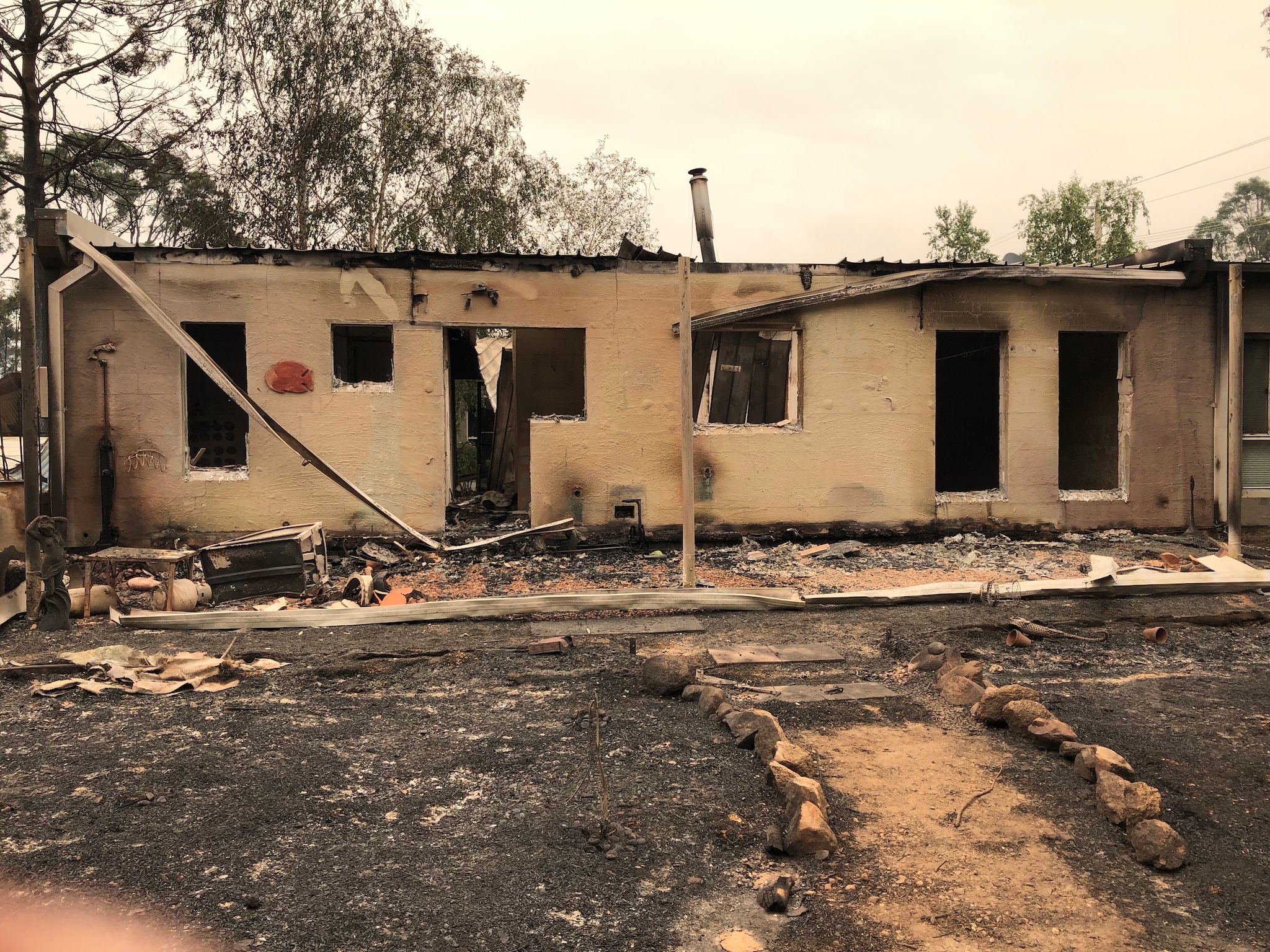
Ms Gilbert's had spent 12 months renovating her home. It was destroyed 11 days after the work was completed. Source: Supplied
The marine biologist moved to Mallacoota, a coastal town in Victoria's East Gippsland region, after buying a property there toward the end of 2018. Twelve months and $50,000 later, it was fully renovated.
The work was completed on 20 December, 2019. Fast forward 11 days and her home "was rubble'.
Ms Gilbert remembers thinking her home would be safe as she evacuated to the Mallacoota Wharf, where many others fled, as the out-of-control fire approached.
"It probably wouldn't have gone if the neighbour's gas bottles had not exploded," she said. "It was actually fate that I wasn't there because that where the hose I would have been using (to fight the fire) is, and that's exactly where the gas bottles came through."
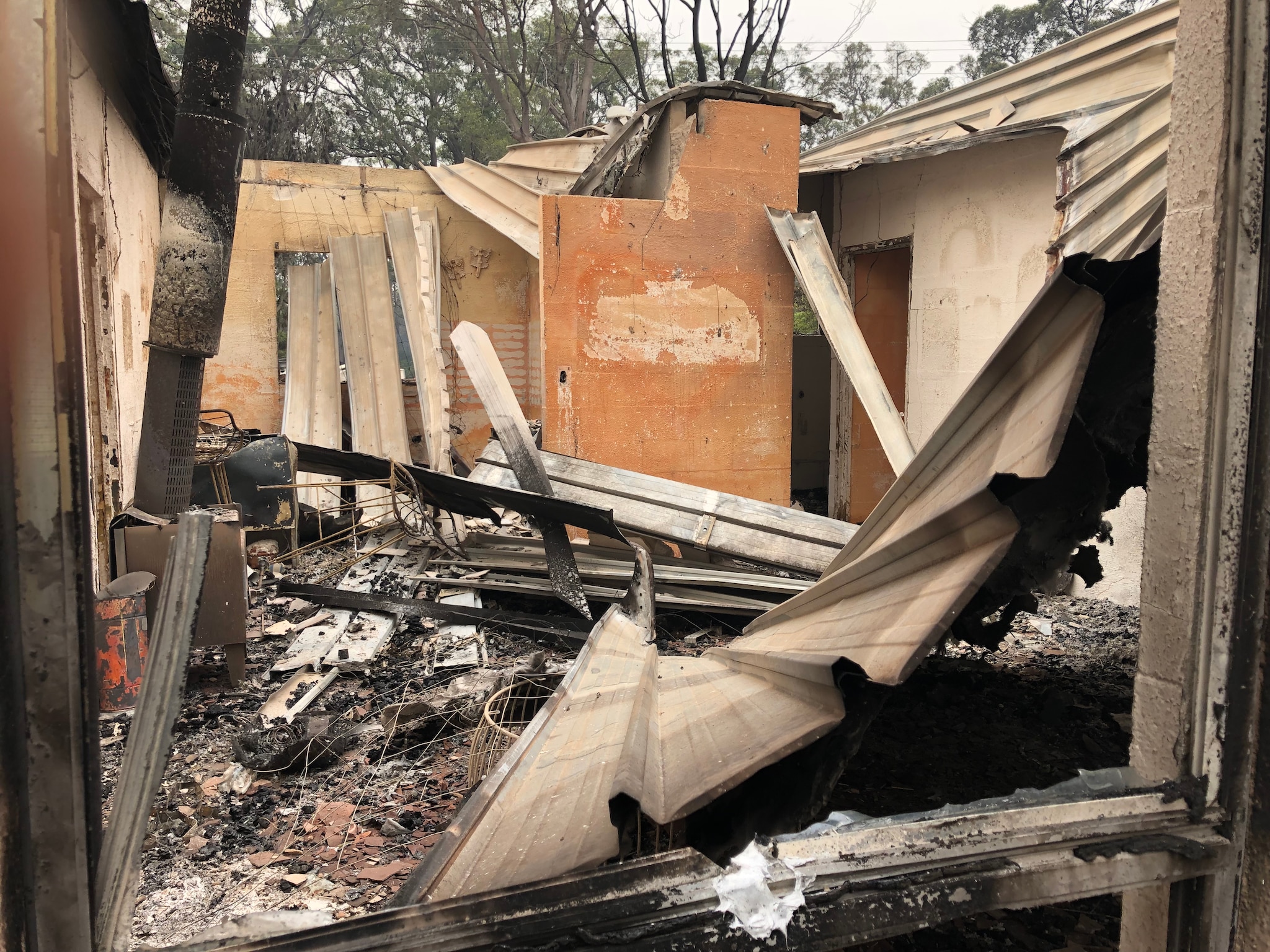
Ms Gilbert said her home "was rubble" when she returned following the fire. Source: Supplied
She said when she returned to the property "there was absolutely nothing left."
"It burnt so hot that it melted all of the windows on the northern and southern side of the house because it had blown in from the eastern side," she said. "And you could see that because all of the glass along the eastern side was smashed, but on the northern and southern windows, the glass was melted from the inside out."
The disaster means a "whole part of her life is now gone."
"[I have] no family photos, nothing from my parents... not one thing was left," she said.
But that wasn't the hardest thing for her — it was the environmental destruction that broke her heart.
"For the first two weeks after the fires all you heard was shotguns being fired, and vets were euthanising injured animals," she said.
She added: "And that's what I can't forgive the government for. What they don't seem to understand is that humans, like all the rest of the other animals on this planet, rely upon this planet for its resources.
"We were the last to arrive in evolutionary terms, we've done the most damage, and we are on the slippery slope to extinction."
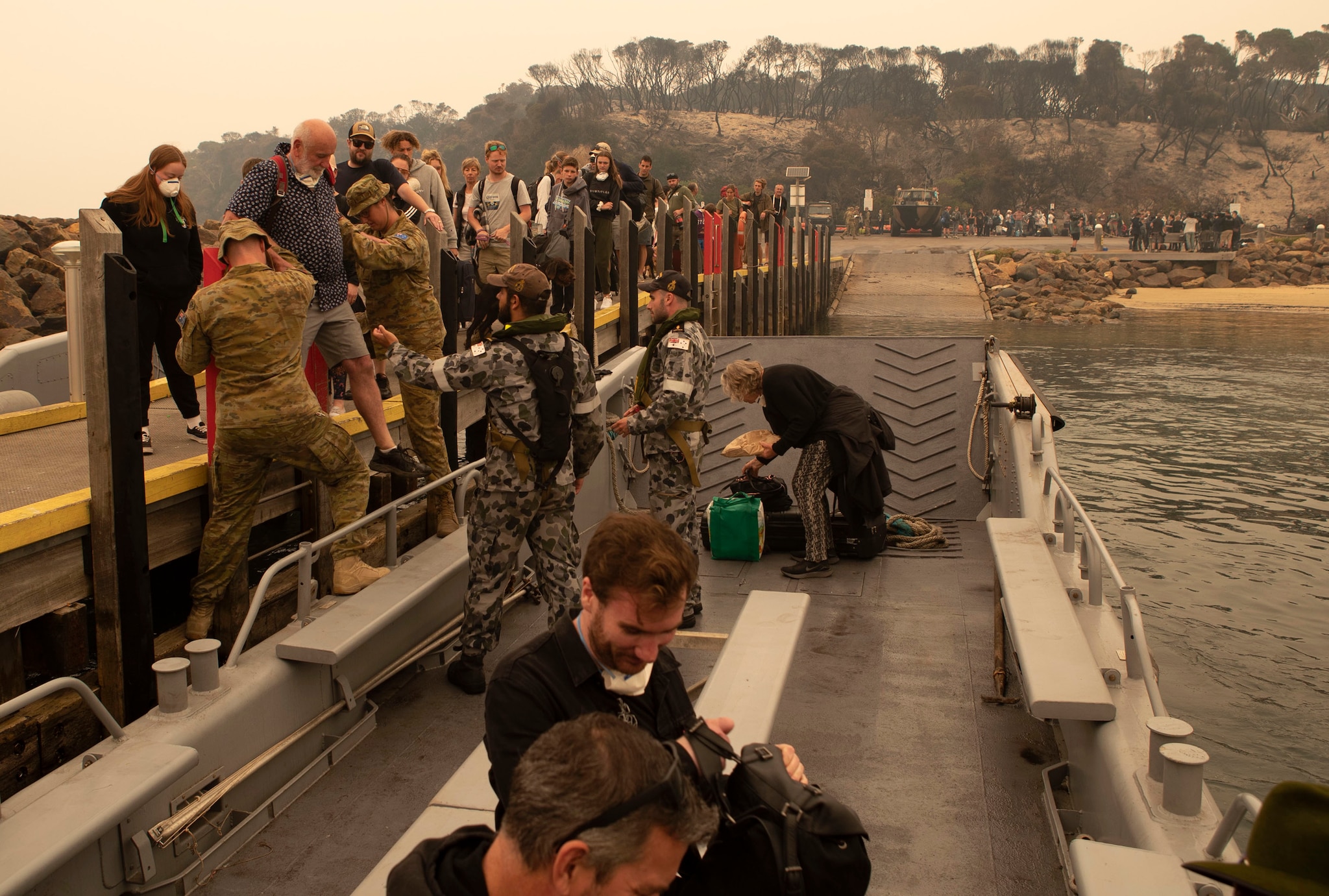
Bushfire evacuees boarding one of HMAS Choules' landing craft at Mallacoota before being ferried to the ship on January 3, 2020. Source: Royal Australian Navy
After the fire, Ms Gilbert was first living in her caravan which survived the blaze and then secured a short-term rental. She finally obtained a modular unit through a Victorian Government initiative which was installed on a block of land she leased from a friend.
She "loves" Mallacoota and had no hesitation in deciding to rebuild and her new home will have a full fire-supression system. But she fears bushfires will continue to cause large-scale damage if climate change is not curbed.
"The thing that bothers me is that... I have no doubt that another catastrophic fire given where we're at with climate change," she said. "I have no doubt there'll be another catastrophic fire within the next four years. And it may not be Mallacoota, but it will be somewhere."
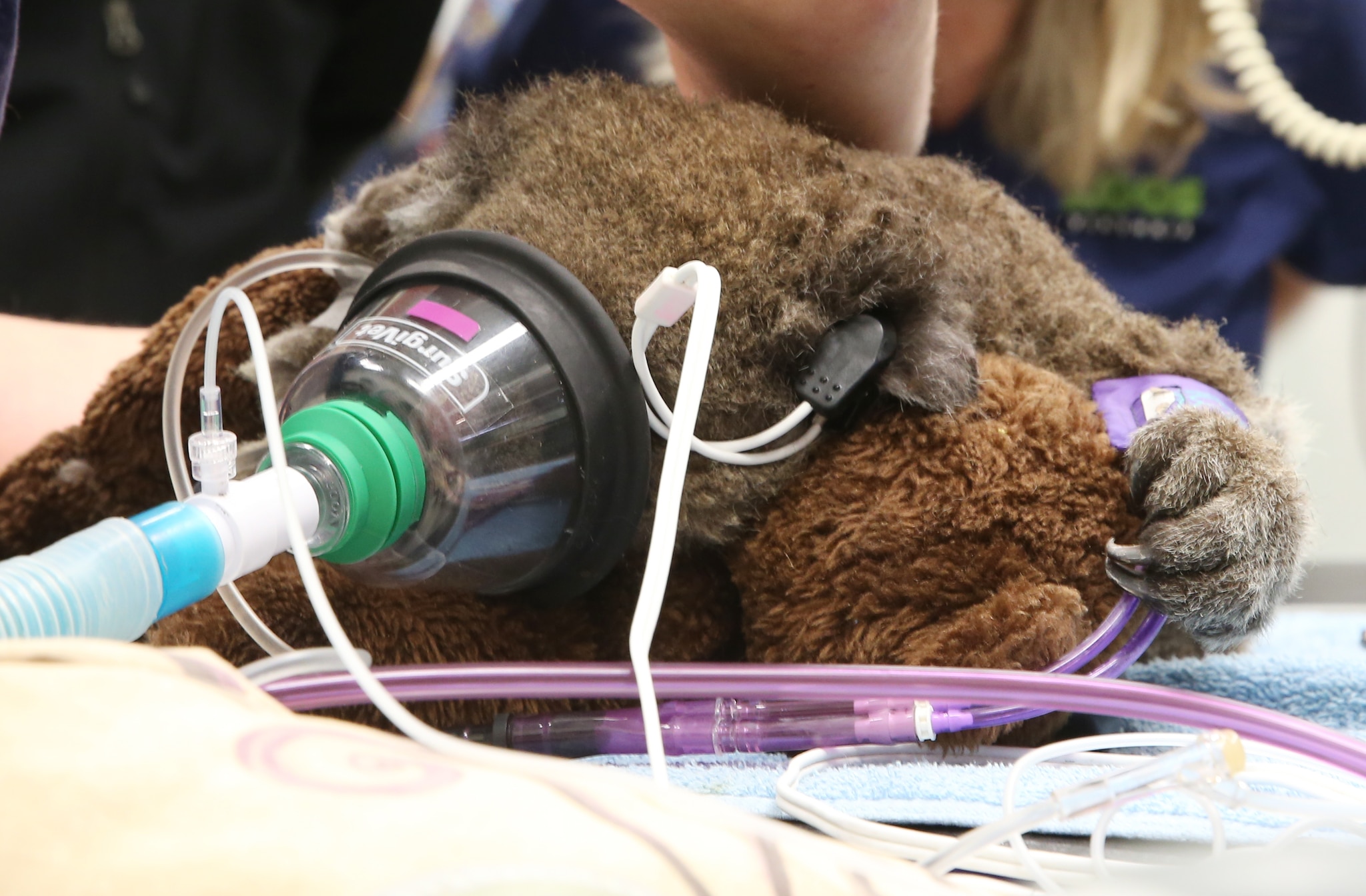
Veterinarians work on Jeremy, a young koala recovering from injuries that was rescued from the Victorian bushfires near Mallacoota, on January 23, 2020. Source: AAP
With Australia's climate having already warmed by an average of 1.4C since 1910, she said: "Can you imagine what 2 degrees is going to look like?"
"I'm just furious at the way that this whole environment climate crisis has been dealt with by both sides of government," she said.
'I want the government to take climate change seriously'
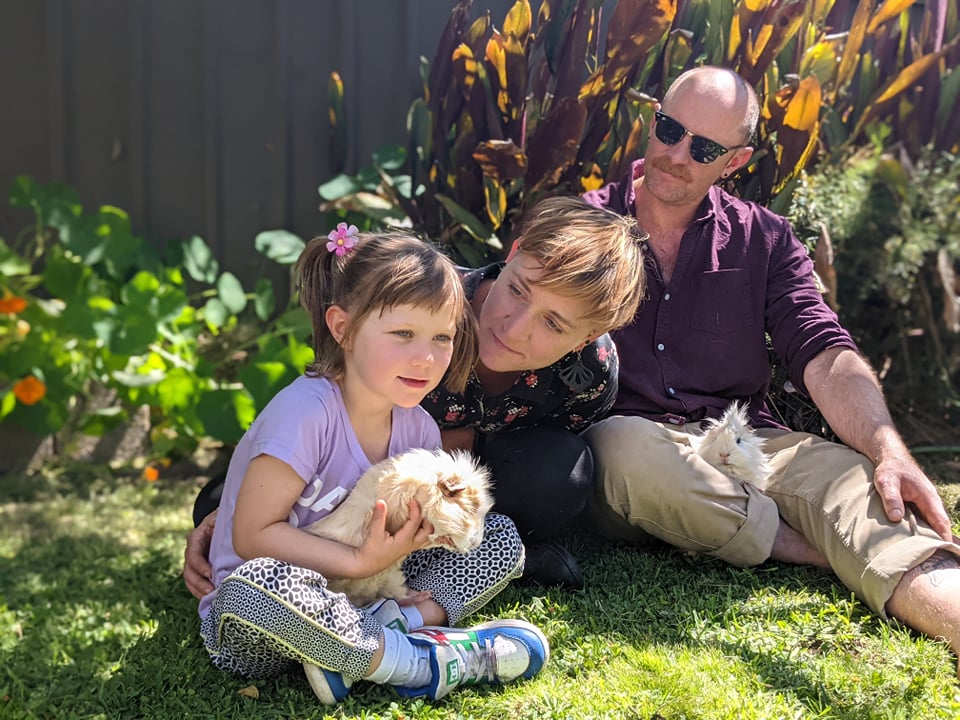
Fiona Lee (centre), with her partner and their daughter. Source: Supplied
Fiona Lee has a similarly harrowing story.
Ms Lee, her partner and their young daughter had been living at their home — which had been built over a long period of time and where they had stayed on-and-off — just outside the town of Bobin in the New South Wales Mid North Coast for full-time for two years.
They were preparing to go camping for the weekend on 8 November, 2019, but instead enacted their bushfire survival plan as they saw "smoke cover the sun and burnt leaves dropping [their] yard".
A few hours later, their house had burnt down.
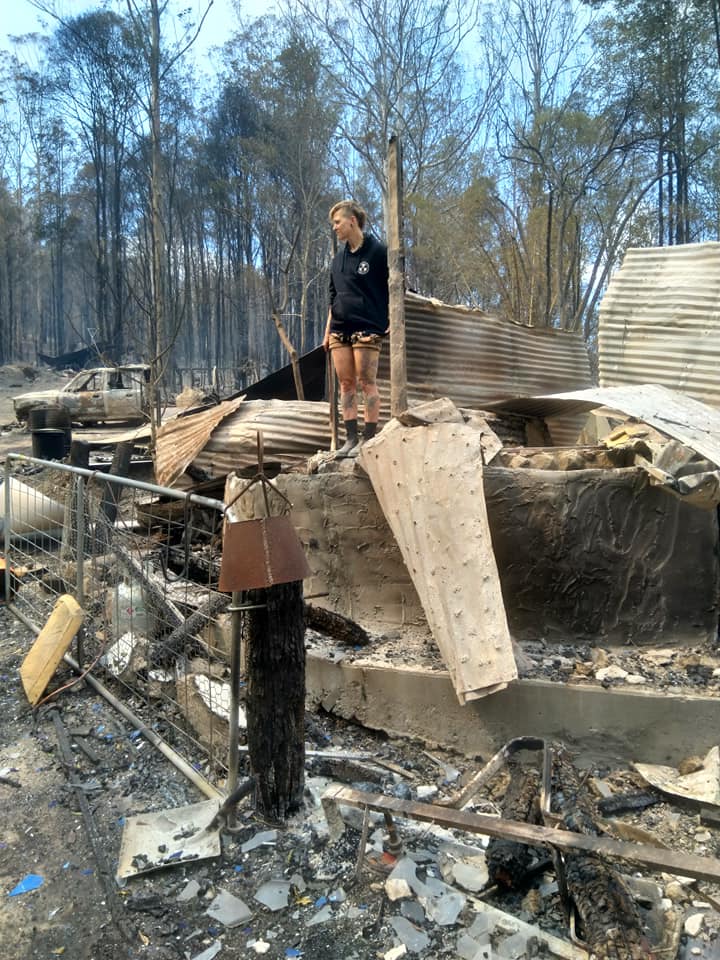
Fiona Lee lost her home near Bobin on the the Mid North Coast in NSW during the 2019-2020 Black Summer bushfire season. Source: Supplied
"The experience of walking back to the house for the first time the next day was so eerie," Ms Lee said. "The bush was dead and quiet, it was like being in a cemetery.
"Everything was totally destroyed. Parts of the car were dripping down the hill and all the glass in the house had melted and everything had folded in on itself. There was nothing left."
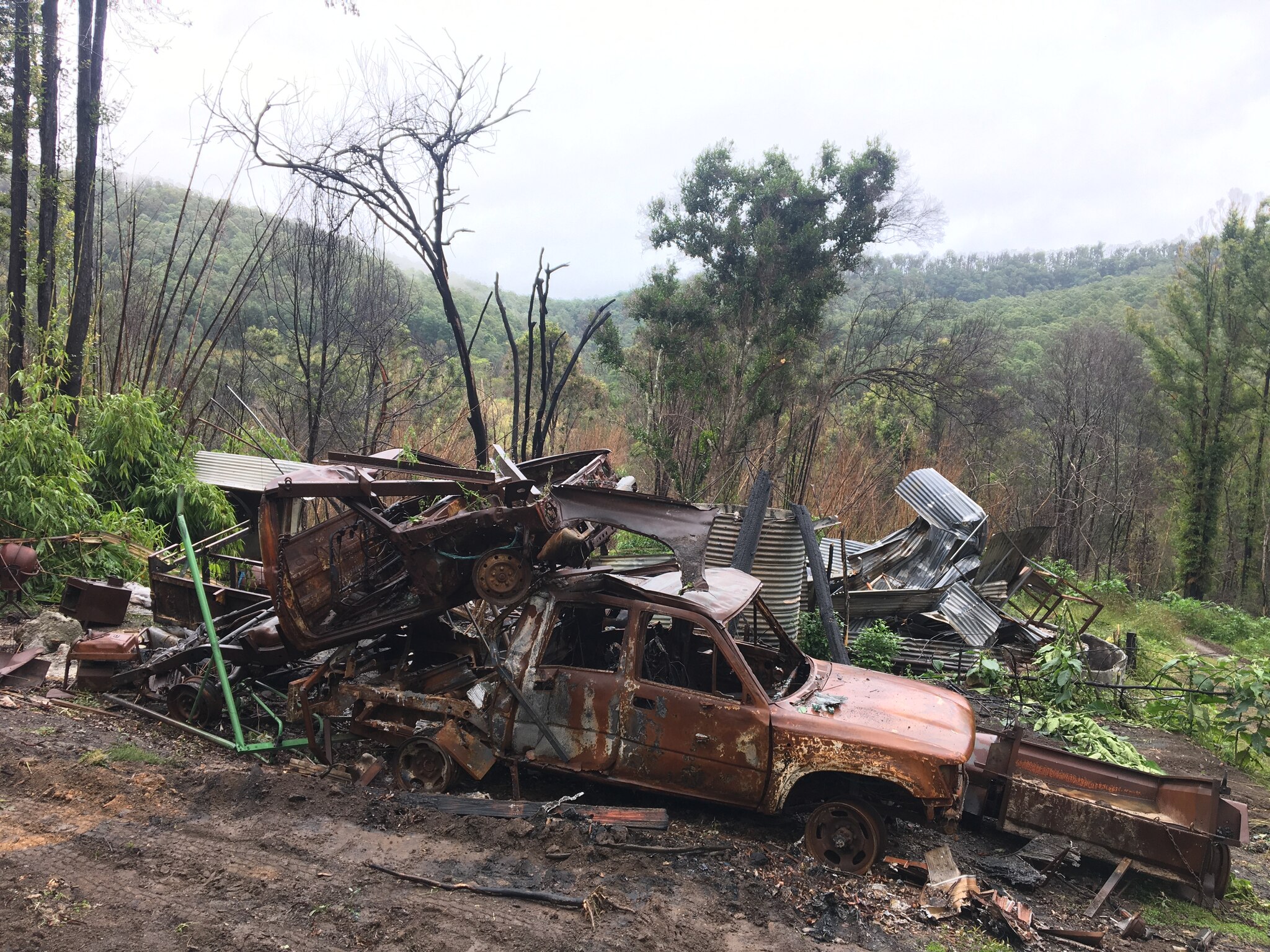
Ms Lee said there was "nothing left" when she returned to her property following the fire. Source: Supplied
The next day, the family moved into Ms Lee's mother's single-bedroom home where they stayed for "a long time" before they eventually secured a rental in Newcastle.
"This is where we currently are. We don't have plans to rebuild," she said.
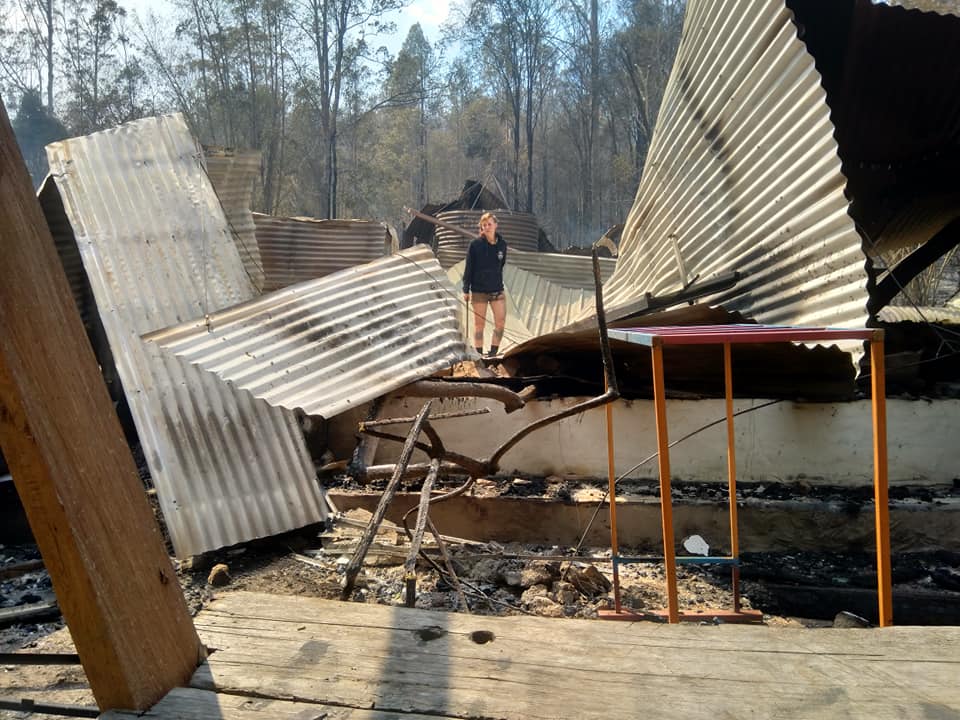
Ms Lee said she has no plans to rebuild her home, which was just outside Bobin on the New South Wales Mid North Coast.
The thought of returning to the bush to live is "difficult", especially if carbon emissions are not reduced "urgently and immediately", she said.
She said she would like the federal government to take "take climate change seriously."
"At COP26, we've seen world leaders stepping up to the climate change challenge and the prime minister barely made it there with a distant net zero target, and not any intentions to cut emissions significantly by 2030," she said.
She believes Australia is "one of the few countries that's still seen as part of the problem and not part of the solution to address climate change."
"I think that the government is full of promises but doesn't actually have any intention of reducing emissions," she said. "I want to see no new investment in coal, oil, and gas projects because we need to address climate change now."
Perfect storm increasing bushfire risk
In 2016, Australia was among many countries to sign the Paris Agreement. The Agreement's goal is to keep average global temperatures to well below 2C and preferably 1.5C through countries reducing their emissions as soon as possible and ultimately reaching net zero by 2050.
To achieve net zero, the amount of greenhouse gases being produced must not exceed the amount being taken out of the atmosphere.
Mr Morrison has said the mid-century target will be achieved through 'technology not taxes', which some have labelled as an ineffective approach.
The plan, released in late October, prioritises investment in clean hydrogen, energy storage, low emissions steel and aluminium, and carbon capture and storage which the federal government has been warned not to rely on.
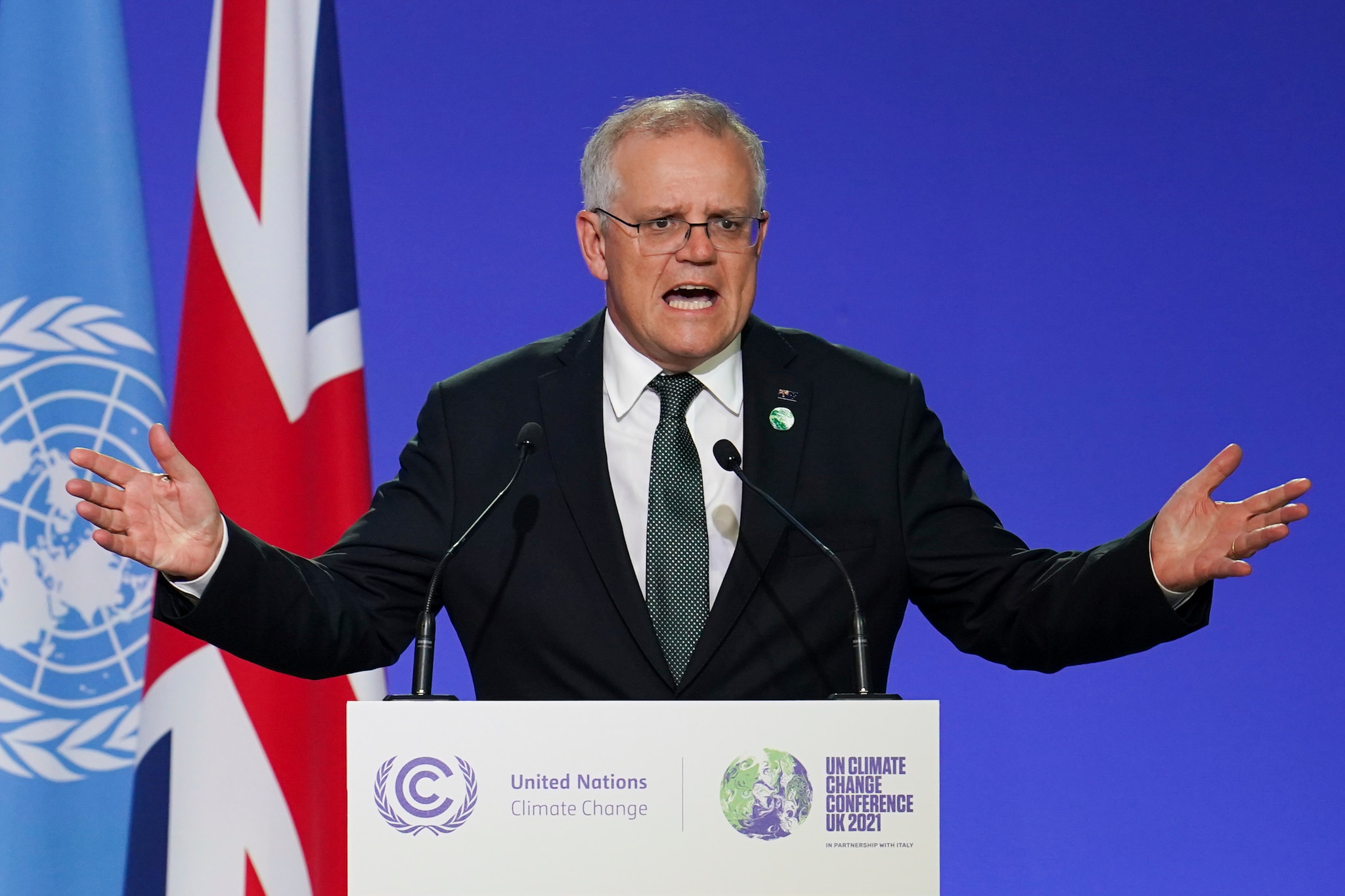
Prime Minister Scott Morrison's government is taking a 'technology not taxes' approach to reducing Australia's carbon emissions. Source: Pool Getty Images Europe
Many scientists believe deeper emissions cuts need to be made by the end of this century to effectively limit global warming.
Indeed, Australian climate scientists recently warned that half of the emissions cuts needed to reach net zero by 2050 would need to be made by 2030 to keep global warming below 2C.
Mr Morrison has resisted committing to life Australia's 2030 emissions reduction target of 26-28 per cent on 2005 levels by 2030, though the government says projections show they could be lowered by 35 per cent by the end of this decade.
READ MORE

‘A great disappointment’: UK climate advisor slams Australia’s emissions targets
Chair of the University of Melbourne's School of Ecosystem and Forest Sciences, Professor Rodney Keenan, said there is a link between climate change and extreme weather events such as bushfires.
"We've seen an increase in average global temperatures and that's leading to temperature extremes in southern Australia which is the most bushfire-prone area," Professor Keenan said.
"We're also seeing a drying trend with a strong decrease in rainfall, particularly in southwestern Australia, but also in southeastern Australia in Victoria and southern New South Wales.
"So the combination of those things is increasing bushfire risk."
What could be done to reduce emissions faster
Professor Keenan said it would have been "quite straightforward" for Mr Morrison to commit to an emissions reduction target of 35 per cent on 2005 levels by 2030 at COP26 because the states all have more ambitious targets.
The New South Wales, South Australian and ACT governments recently announced a "historic" agreement to work together to reach net zero emissions. The Western Australian government also signed on to the forum and said it was "necessary" in "the absence of real leadership from the federal government".
Professor Keenan said the federal government "needs to be making clear policy commitments to meet its [emissions reduction] objectives."
READ MORE

Fossil fuels vs renewables: Where the world's top 20 emitters stand
"The expectation that the technology will develop as a matter of course and that it will then be adopted is a very hopeful one; that the market will essentially solve this with a bit of input from the government on the technology development side," he said.
"I think it's clear that in order to drive the adoption and deployment of this technology, there needs to be clear price signals and other policy measures."
A "national consensus" on how to address the climate challenge was also necessary.
"We've argued in a recent article that it might be time for a national climate accord where the prime minister convenes the different sectors, the states and the different community groups, Indigenous communities and others to come together and talk through difficult tradeoffs and challenge."
READ MORE

US, China agree to boost their climate ambitions
Australia was not among a large cohort of countries to sign a pledge to transition away from coal — one of the most polluting fossil fuels — at COP 26. The nation also did not sign a pledge to reduce methane emissions.
Founder of Emergency Leaders for Climate Action and former commissioner of Fire & Rescue NSW, Greg Mullins, said that was a disappointing decision that put the nation's future prosperity at risk because coal would become more difficult to sell as other countries turned their backs on it.
Mr Mullins is also concerned by the federal government's technology-driven approach to emissions reduction. He believes a price on carbon would be more effective.
He said the money being invested in carbon capture and storage should instead go toward "subsidies for people to put solar panels on their roofs and get batteries", and to build wind turbines.
More trees, which absorb carbon dioxide, should also be planted, he said.
"I think this technology push is interesting but basically futile. And it's putting it off for someone to do the heavy lifting when it inevitably fails," he said.
In response to questions from SBS News, a spokesperson for Energy and Emissions Reduction Minister Angus Taylor said "Australia’s emissions reduction story has been one of consistent achievement – our emissions are now more than 20 per cent below 2005 levels".
"We have reduced emissions faster than any other major commodity exporting nation in the world, and faster than the OECD average, Canada, Japan, NZ and the US," the spokesperson said.
Australia’s 'long-term emissions reduction plan' "sets out a credible pathway to net zero by 2050, while preserving our existing industries, including our important export-oriented agriculture, resources and energy industries", the spokesperson said.
READ MORE

Australians will be financially better off under net zero plan, climate modelling shows
"Australia has already reduced methane emissions faster than any other major methane emitter, including the US, except for the EU and Canada."
SBS News contacted Labor's Climate and Energy spokesman Chris Bowen for comment.

No comments:
Post a Comment